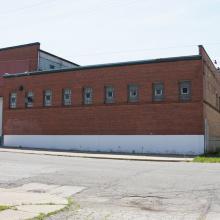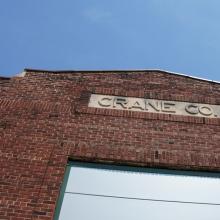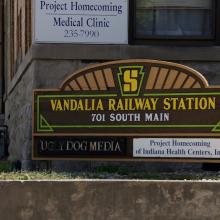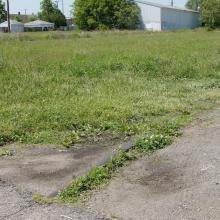56 Hits for June 2014
Albums (0) & Images (56)
Another industrial building on South Bend’s south side, off Franklin.
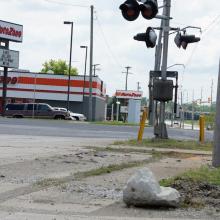
Close-up view of spur and crossing gate.
Another view of the former spur into South Bend Gravel.Close-up view of spur and crossing gate.
Another view of the former spur into South Bend Gravel.
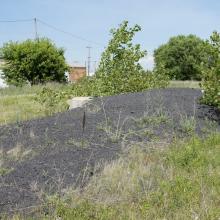
Coal pils
Coal piles from the transload operation, moving coal from rail to truck for Notre Dame.Coal pils
Coal piles from the transload operation, moving coal from rail to truck for Notre Dame.
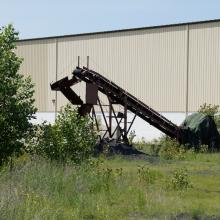
Conveyer belt.
Equipment used during transload of coal off the NS (NJI&I) from hoppers to trucks to service the University of Notre Dame’s power plant. ND was once serviced directly by Conrail (ex-PC, NYC) but when NS took over Conrail it embargoed service over the 3.2 mile line to ND and forced ND to use trucks. ND since then moved mainly to natural gas for its power plant so it is unclear how much use this transload operation still sees.Conveyer belt.
Equipment used during transload of coal off the NS (NJI&I) from
hoppers to trucks to service the University of Notre Dame’s power
plant. ND was once serviced directly by Conrail (ex-PC, NYC) but
when NS took over Conrail it embargoed service over the 3.2 mile
line to ND and forced ND to use trucks. ND since then moved mainly
to natural gas for its power plant so it is unclear how much use
this transload operation still sees.
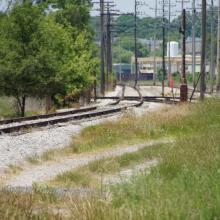
Criss-crossing tracks.
Former Conrail/NYC track that crossed the South Shore to reach Bendix. Bendix (now Bosch) is no longer rail served.Criss-crossing tracks.
Former Conrail/NYC track that crossed the South Shore to reach Bendix. Bendix (now
Bosch) is no longer rail served.
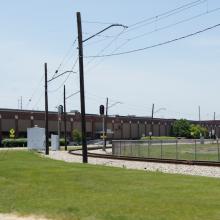
Curved track under wires.
South Shore and later NICTD track. Originally built by the South Shore to reach freight customers and later used by NICTD to access the South Bend airport terminal. The former Bendix factory-a South Shore customer at one time-is in the background.Curved track under wires.
South Shore and later NICTD track. Originally built by the South Shore to reach freight
customers and later used by NICTD to access the South Bend airport terminal. The
former Bendix factory-a South Shore customer at one time-is in the background.
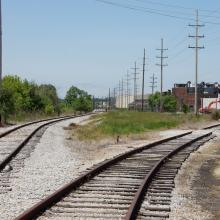
Diverging tracks with white ballast and orange backhoe in the distance.
The track on the left or south was the former South Shore lead to its original downtown South Bend station and coach yard as well as multiple freight customers. The track on the right was used to service Bendix. In later years the South Shore successor freight operator used it to store coal hoppers. When passenger service was cut back to a new building shared with Amtrak in 1971 on the outskirts of west South Bend the track on the left became the track to reach the new station at Meade and Washington. After NICTD relocated to the South Bend airport terminal in the 1990s Amtrak continues to use this station.Diverging tracks with white ballast and orange backhoe in the distance.
The track on the left or south was the former South Shore lead to its original downtown
South Bend station and coach yard as well as multiple freight customers. The track on
the right was used to service Bendix. In later years the South Shore successor freight
operator used it to store coal hoppers. When passenger service was cut back to a new
building shared with Amtrak in 1971 on the outskirts of west South Bend the track on the
left became the track to reach the new station at Meade and Washington. After NICTD
relocated to the South Bend airport terminal in the 1990s Amtrak continues to use this
station.
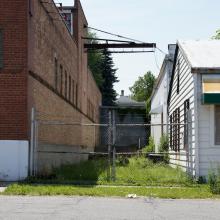
Former PRR spur on west side of
Former PRR spur on west side of Franklin and north of Calvert. This spur serviced several different industries at one time.Former PRR spur on west side of
Former PRR spur on west side of Franklin and north of Calvert. This spur serviced
several different industries at one time.
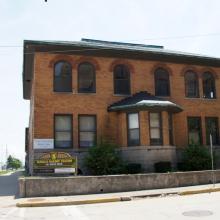
Former PRR Vandalia Line depot.
The Pennsylvania’s Vandalia Line terminated in South Bend across the street from Studebaker’s headquarters at this station. The PRR also serviced Studebaker from tracks that were just west of the station.Former PRR Vandalia Line depot.
The Pennsylvania’s Vandalia Line terminated in South Bend across the street from
Studebaker’s headquarters at this station. The PRR also serviced Studebaker from tracks
that were just west of the station.
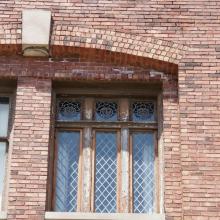
Former Studebaker Administration Building.
Another view of Studebaker’s former headquarters. Studebaker at one time was serviced by its own in-house industrial railroad as well as by competing Class I railroads and their affiliates including the NYC, the PRR, and Wabash. Studebaker eventually shut down its South Bend plant in December of 1963 and consolidated remaining auto production at its Hamilton, ON, plant. In 1966 Studebaker eliminated its automotive division to focus on other, more profitable lines of business and its headquarters were relocated to New York City.Former Studebaker Administration Building.
Another view of Studebaker’s former headquarters. Studebaker at one time was serviced
by its own in-house industrial railroad as well as by competing Class I railroads and their
affiliates including the NYC, the PRR, and Wabash. Studebaker eventually shut down its
South Bend plant in December of 1963 and consolidated remaining auto production at its
Hamilton, ON, plant. In 1966 Studebaker eliminated its automotive division to focus on
other, more profitable lines of business and its headquarters were relocated to New York
City.
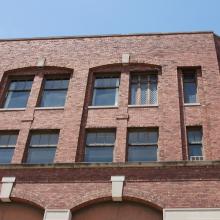
Former Studebaker Administration Building.
This building was the former headquarters for Studebaker which was an independent American auto manufacturer. Later it was the headquarters for the South Bend public schools. In recent years it was purchased by the City of South Bend which is in the process of restoring it.Former Studebaker Administration Building.
This building was the former headquarters for Studebaker which was an independent
American auto manufacturer. Later it was the headquarters for the South Bend public
schools. In recent years it was purchased by the City of South Bend which is in the
process of restoring it.
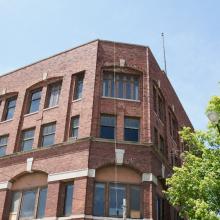
Former Studebaker Administration Building.
The notched look of the Studebaker headquarters building at the NW corner of Bronson and Main in downtown South Bend was to accommodate a track that once connected the PRR’s Vandalia Line to the NYC. When the NYC (and Grand Trunk) were elevated onto a viaduct through downtown South Bend the connection was severed to the PRR but the notch remained.Former Studebaker Administration Building.
The notched look of the Studebaker headquarters building at the NW corner of Bronson
and Main in downtown South Bend was to accommodate a track that once connected the
PRR’s Vandalia Line to the NYC. When the NYC (and Grand Trunk) were elevated onto
a viaduct through downtown South Bend the connection was severed to the PRR but the
notch remained.
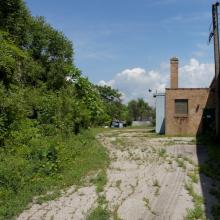
Grassy area between buildings.
Location of former PRR spur east of Franklin and north of Calvert.Grassy area between buildings.
Location of former PRR spur east of Franklin and north of Calvert.
